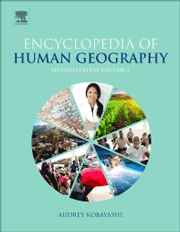|
Inhalt :: Content
Umfassendes, internationales Referenzwerk mit über 800 ausführlichen Beiträgen zu Gegenstandsbereichen, Konzepten und Theorien der Humangeographie und ihrer Teilgebiete (Wirtschaftsgeographie, Bevölkerungsgeographie, Siedlungsgeographie, Verkehrsgeographie, Politische Geographie, Historische Geographie, Wahrnehmungsgeographie, Neue Kulturgeographie, Sozialgeographie, Geographische Entwicklungsforschung, Raumforschung / Raumordnung / Raumplanung u.a.).
Gegenüber der 1. Auflage wurde das Werk um rund 200 neue Beiträge erweitert, über 500 Beiträge wurden aktualisiert und überarbeitet.
Der Online-Ausgabe liegt die 2019 veröffentlichte, 12-bändige Printausgabe zugrunde.
|

|
|
Verlagsinformation :: Publisher's information
International Encyclopedia of Human Geography, Second Edition embraces diversity by design and captures the ways in which humans share places and view differences based on gender, race, nationality, location and other factors—in other words, the things that make people and places different. Questions of, for example, politics, economics, race relations and migration are introduced and discussed through a geographical lens. This updated edition will assist readers in their research by providing factual information, historical perspectives, theoretical approaches, reviews of literature, and provocative topical discussions that will stimulate creative thinking.
Key Features
- Presents the most up-to-date and comprehensive coverage on the topic of human geography
- Contains extensive scope and depth of coverage
- Emphasizes how geographers interact with, understand and contribute to problem-solving in the contemporary world
- Places an emphasis on how geography is relevant in a social and interdisciplinary context
Readership
Researchers, teachers, and students of geography, sociology and social science. Those in cognate disciplines, including cultural studies, development studies, gender studies, economics, health studies, planning, political science, sociology; members of the media and the arts; policy makers
Table of Contents
The second edition contains approximately 800 articles which are structured around the following themes:
- Cultural: Topics include: cultural geography; cultural theory; cultural studies; postcolonial geographies; indigenous geographies; education; ethnicity; geography and religion; geography and the humanities; geography and the media (film, print, creative industries); popular culture; more-than-human representations
- Economic: Topics include: economic development; economic theories; spatial theories; urban economic geography; economic inequalities; housing; industrial geography; geographies of labor and job provision; transportation and communication; technology; world trade and trade policies; modernization and global economies; neoliberalism
- Historical: Topics include: Landscape development; Historical representations/re-presentations/more-than-representations; Histories of the discipline; Historical geographies of political/conflict/border-making events; Historical GIS; Institutional historical geographies; Political economies; Colonialism and imperialism
- Health: Topics include: health geography; medical geography; geographies of care; emotional geographies/geographies of mental health; therapeutic places; health care systems and institutions; healthcare policies; critical disability studies; epidemics and pandemics; international health aid; health and development; health and the built environment
- Methods: Topics include: Cartography; methodology/paradigms; digital technologies; quantitative methods; qualitative methods; ethics and methods; surveys; GIS; participatory research
- Nature/Society: Topics include: theories of nature; human/society and nature relations; climate change; natural disasters; energy issues; rural geographies; recreational geographies; non-human geographies; Anthropocene; environmental racism
- Political/Philosophy: Topics include: Geopolitics; human rights; neoliberalism; political theory; international security; borders and boundaries; electoral geographies; public policy; governance; peace and conflict; politics of religion; political migration; international relations; international conventions; electoral geography
- Population: Topics include: population growth and distribution; demographic change; digital technologies for population representation; migration; refugees; population and development; population and warfare/religion/governance; geographies of aging; globalization; racialization; gender
- Social: Topics include: social relations; difference; multiculturalism; race and racism; feminist geographies; radical geographies; relevance and social issues; urban social geography; social theories; housing and social services
- Urban: Topics include: What is urban?; urban historical geography; urban ecology; crime and policing; residential development, including segregation; urban models
|

